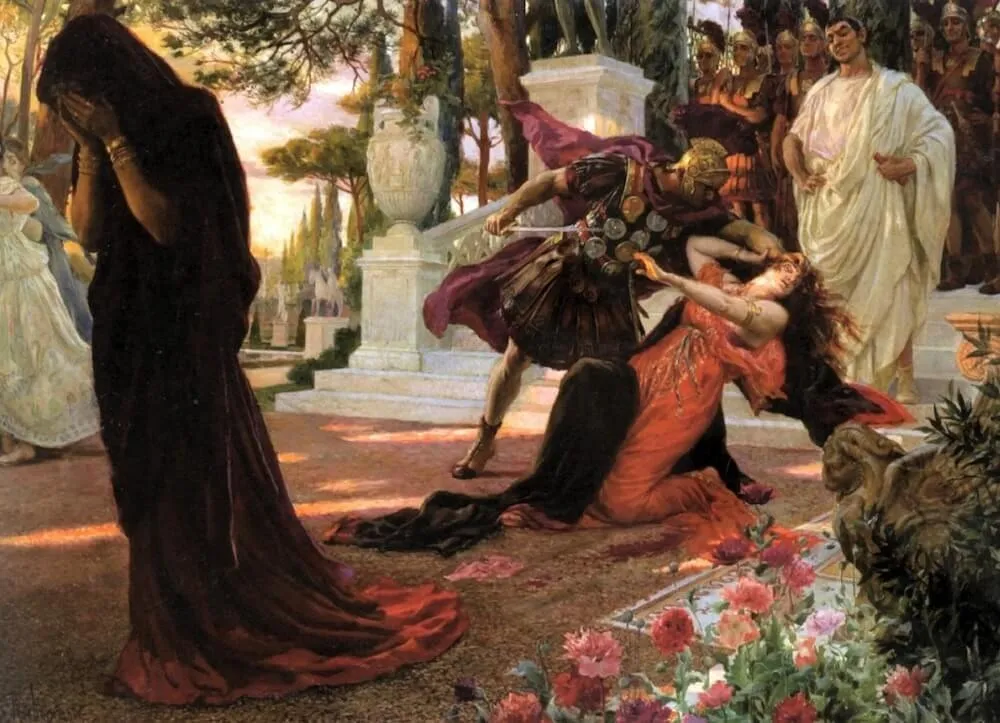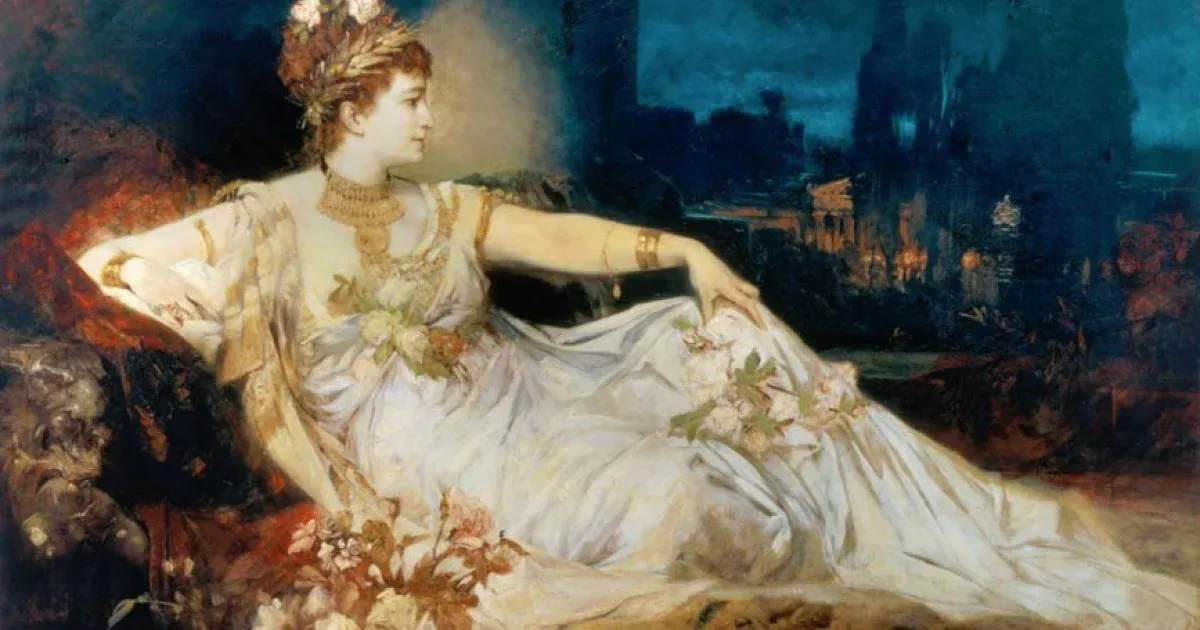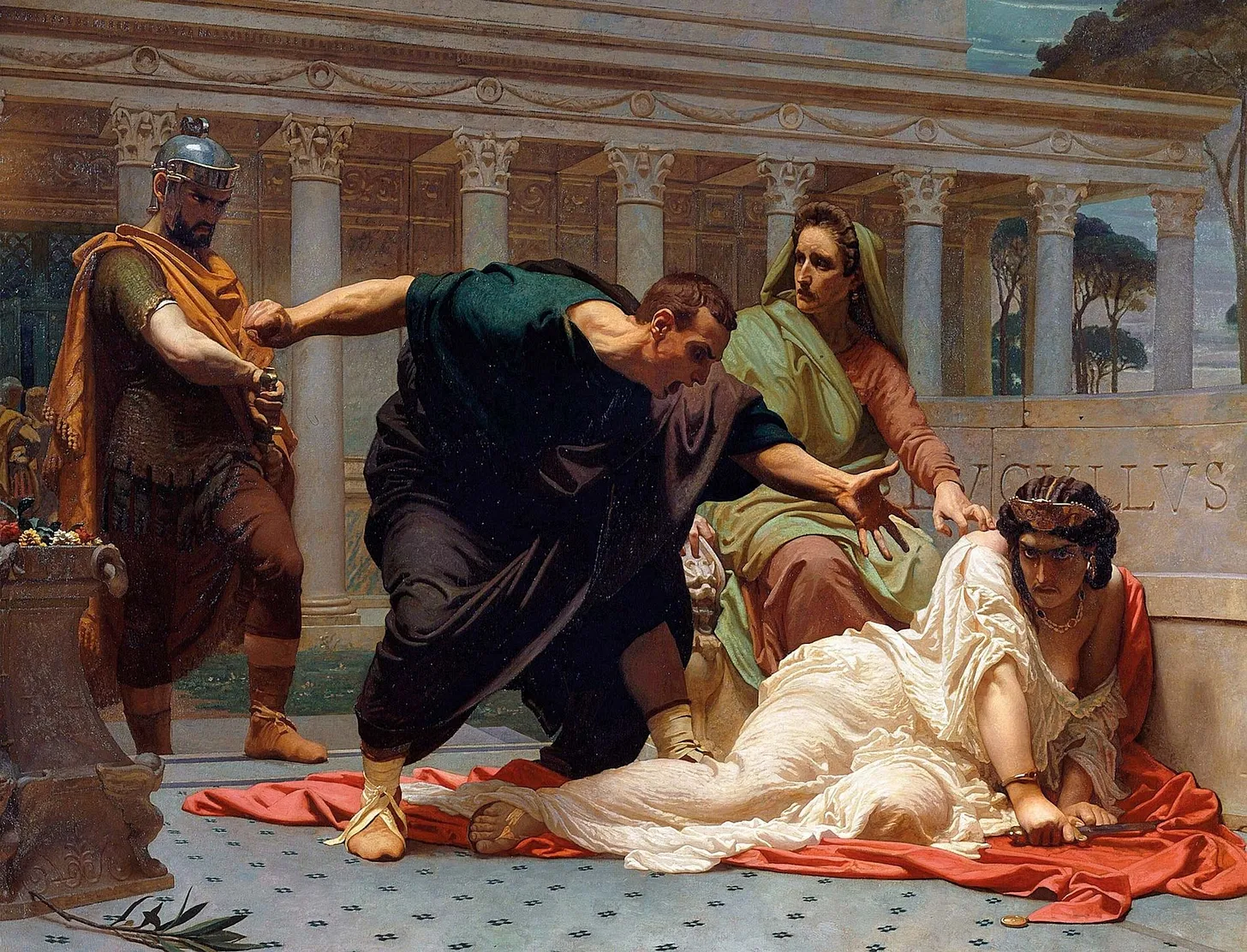At the legendary nuptials, the aroma of exotic spices and the sound of raucous laughter filled the air as guests were feted on savory cuisine and gorged themselves on fine wine. The bride tore off her veil, revealing cascading wild hair; in true Bacchic fashion, she shook her head and wielded a thyrsus, or Bacchic wand. Gyrating to the ecstatic music was her handsome, ivy-adorned groom, bedecked in cothurni—footwear associated with Bacchus—whirling beneath the glittering stars. Amidst the cacophony of a debauched chorus, guests danced with wild frenzy, their movements a blend of color and chaos, as the couple basked in the euphoric embrace of the night.
Tacitus reports that prior to the manic Bacchic celebration, a traditional wedding had taken place where solemn vows were exchanged, auspicious words spoken, and appropriate sacrifices made. Yet for all its seeming regularity, he is astounded by the singularity of the event. The bride, after all, was no blushing maiden but rather the married empress herself, Messalina (17/20 CE–48 CE)—wife these ten long years to Claudius (10 BCE-54 CE), the living emperor, who was away on a brief trip. The ill-conceived wedding was one of the most audacious episodes of the Julio-Claudian dynasty, and because it challenged the authority of her husband, the emperor, it was considered treasonous. Following the emperor’s return and the revelation of his wife’s treachery, Messalina and her groom (Roman Senator and consul designate, Gaius Silius) were summarily executed.

Over the past two thousand years, historians have been scratching their heads in disbelief at Messalina’s madness. Why would she jeopardize her reputation, her marriage, her children, and her very life for the whimsy of an unlawful wedding? What could possess a woman of such power and privilege to engage in an act so reckless?
Messalina has been maligned throughout the ages for her rapacious sexual appetite; the most lewd and debauched acts have been attributed to her—though most historians today believe them to be examples of ancient misogynist hyperbole. Predictably, the ancients portray Messalina’s decisions as capricious and promiscuous rather than deliberate and calculating. Was the notorious wedding really a caprice of her libertine disposition, as the ancients report, or a strategic maneuver to overthrow Claudius?
Frequently steeped in bias, the accounts of Messalina’s imprudence chiefly depend on the myopic lenses of three ancient chroniclers. Because his report of her unlawful marriage and its subsequent backlash is the most thorough, this essay looks at the last days of Messalina’s life as outlined in Tacitus’s (56-120 CE) Annals. One of Tacitus’s primary sources is the Memoirs of Agrippina the Younger (lost to us). Hardly unbiased, after Messalina’s death Agrippina was her successor but during her life she was her arch-enemy. The other two chroniclers are Suetonius (69-122 CE) in Lives of the Twelve Caesars, and Cassius Dio (165-235 CE) in Roman History. These three historians wrote during the reigns of emperors who were hostile to the Julio-Claudian dynasty anywhere from fifty to two hundred years after Messalina died. Otherwise put, to write positively of Messalina (or Claudius) was to put their lives at risk.
Though unkind to the Julio-Claudians in particular, the ancients are especially harsh to the women of the clan. These unreliable narrators portray powerful females through a lens of profound skepticism, often emphasizing their supposed hypersexuality, authoritarianism, and political ambitions. This perspective has affected later accounts of history and is still present among modern historians, who often see the ancients’ biases as irrefutable facts. The negative publicity surrounding Messalina complicates our understanding of her; yet recognizing the distortions in the narratives spun by the ancients may help enable us to see her more clearly.

Born in 17-20 CE into the sovereign world of privilege and power, Messalina was a great-grand-niece of the Emperor Augustus through both her paternal and maternal lines—she was the double great-granddaughter of Octavia, Augustus’s sister. By reinforcing authority within their lineage, significant inbreeding marked the Julio-Claudian dynasty. To be sure, elite Roman females had no authority over whom they could marry; this was especially true for the Julio-Claudians, whose marriages were strategically arranged political alliances. In 39 or 40 CE, Messalina married Claudius, her first cousin once removed. Typical for the era, Messalina was no more than 18 years of age at the time of her marriage. In the hyper-patriarchal Roman world, it was customary for girls aged 14 and older to marry; their youth ensured the potential for early and prolonged childbearing throughout their reproductive years. Claudius, however, was 47 upon his third marriage to Messalina. While age disparities were prevalent in ancient Rome, considerable age differences (thirty years or more) often elicited censure. But the age discrepancy between the two cousins was not the only detail that set the couple apart.
In addition to being considered past his prime in the ancient world, Claudius had many physical ailments, which put him out of running as a serious contender for the throne. Ironically, many historians hold the belief that his physical infirmities may have saved his life by enabling him to successfully navigate the fratricidal power dynamics within the Julio-Claudian clan. Reportedly called a monster by his own mother and ridiculed throughout his life by family members because of his physical ailments (walking with a discernible limp, exhibiting involuntary head and limb shaking, and frequently drooling and foaming at the mouth), it was believed that he suffered from mental deficiencies as well and did not have a long life ahead of him. Claudius, however, had the last laugh. A history buff, he authored over eighty books on ancient history and lived to be sixty-three, outliving all of his male contemporaneous relations.
Moreover, despite the odds against him, Claudius not only survived the paranoid and homicidal reign of his nephew, Caligula, but, implausibly, due to the chaotic conditions following Caligula’s assassination, he succeeded him to the throne in 41 CE. By that time Claudius and Messalina had been married for three years; they had a daughter, Claudia Octavia (39-62 CE), and their son, Britannicus (41-55 CE)—heir to the throne—was born three weeks after Claudius’s ascension.
In the Annals, the reader finds a malicious and greedy Messalina ceasing her savagery against unwitting players when she falls hard for the handsome Gaius Silius, who is regarded “as the best looking of Rome’s young men.” Although Silius was married at the time of their initial infatuation, Messalina compels him to divorce his wife (Junia Sinia); thus she “assumed possession of her now unattached lover.” Silius, however, was much more than just a pretty face; he was an up-and-coming political leader who was not only a senator but was also nominated as consul designate for 49 CE; consuls—typically two at any given time—were the highest-ranking magistrates in ancient Rome.
Tacitus makes much of Messalina blatantly visiting Silius’s home, often accompanied by an entourage. In Tacitus’s retelling, she showers him with wealth and praise: “…..there was an exchange of fortunes, with the slaves, freedmen, and trappings of the emperor on view at the lover’s house.” The affair becomes widely known in Rome, serving as an indictment not only against the promiscuous Messalina but also against a heedless Claudius, who remained ignorant of it.
As emperor, Claudius assumed the responsibility for preserving the morals of the state, yet it would seem that he could not preserve them in his own house. Tacitus paints a picture of Claudius as a feeble man whose lack of agency was Messalina’s gain. Cassius Dio concurs, “He, more conspicuously than any of his peers, was ruled by slaves… and by women.” Despite
his power and authority, say the ancients, Claudius often found himself manipulated by those close to him, unable to see through the schemes that surrounded his court.
Before too long the affair begins to lose its luster for Messalina. Perhaps too ambitious for his own good, Tacitus claims that Silius wants to end the secrecy: “They had not come so far just to wait for the emperor’s old age.” Silius, now unmarried and childless, is ready to marry Messalina and adopt Britannicus, heir to the throne. He tells Messalina that preempting an unsuspecting Claudius would enhance their safety, as the emperor would swiftly become enraged once he learns the truth about the affair. For Silius there was no easy way out. Although marriage carried inherent dangers, doing nothing may have spelled certain doom as well. Thus the plan to marry was hatched. They waited until Claudius is away on a brief trip to Ostia—a port 30 kilometers southwest of Rome— before staging the event. “I am well aware that it will seem incredible”, writes an astonished Tacitus, “that, in a city that knows all and conceals nothing, any members of the human race could have been so reckless.”
While Messalina’s actions had “shaken the house of the princeps (emperor)” in Tacitus’s tale it is Claudius’s freedmen—not the emperor— who effectively control the situation. A freedman was an individual who had been liberated from slavery via a process called manumission. It is useful to note that some time prior to the notorious marriage, Messalina had orchestrated the removal and subsequent execution of Polybius, one of Claudius’s respected freedmen. Prior to this, Messalina and the freedmen worked in concert with each other; recognizing their mutual interests, the freedmen aligned their success with hers. After she murdered one of their colleagues, however, they gradually withdrew their support. Following the wedding, the stunned freedmen were anxious about surviving the political coup that it represented and carefully orchestrated the circumstances that would lead to Messalina’s downfall.
Once more, the reader finds a Claudius who is oblivious to the events occurring within his own household. Initially, his freedmen hesitate in revealing Messalina’s treachery due to Claudius’s affection for his wife—-coupled with his volatile temperament. Jointly they resolve to employ two prostitutes—with whom the emperor had relations—to break the news to him. Upon receiving the news, Claudius rapidly falls from a state of shock into one of sheer panic persistently questioning “if he is still master of the empire and if Silius was still a private citizen?” His freedman, Narcissus—who plays a significant role in the melodrama—is skilled at appealing to Claudius’s sentiments. After Caligula’s assassination, Claudius is fearful for his bodily safety thus Narcissus wastes no time in emphasizing that the marriage of the empress to a consul designate constitutes nothing less than a coup: “Are you aware that you are divorced?” and advises Claudius that because the people, the senate, and the soldiers saw the wedding, it is imperative for the out of town emperor to move quickly; otherwise, “your wife’s new husband holds the city.” Emphasizing the gravity of the situation, Narcissus alerts the emperor that prompt action can still preserve his authority and indecision will only empower his adversaries and jeopardize his rule.
Moreover, Narcissus, who helped persuade Claudius to view the unlawful marriage as an attempted coup, becomes concerned that an ambivalent Claudius would forgive his wife and that a reconciliation between the couple could jeopardize his influence with the emperor. Thus Narcissus was instrumental in keeping Messalina and Claudius apart—sealing Messalina’s fate.

Once again, setting the scene, Narcissus chose senators who would accompany the emperor on their journey back to Rome with Claudius. These senators were not only hostile to Messalina but also support Narcissus’s account of the wedding. Further, because he could not trust the Praetorian Prefect to speak out against Messalina, Narcissus induces Claudius to turn over command of the Praetorian Guard to him for the day. Narcissus not only controls the official narrative but also the armed contingent within the city.
Meanwhile, Messalina’s supporters tell her “that Claudius was aware of everything and that he was on his way, eager to exact vengeance.” Fully aware of her power over him, Messalina is determined to meet and be seen by her husband. She meets the carriage en route to the city and screams that “he should listen to the mother of Octavia and Britannicus,” but Narcissus’s shouts were louder and his tactics shrewder. He hands the emperor writing tablets detailing Messalina’s depravities to divert his attention from looking at his alluring wife.
In more vain attempts to win him back, Messalina sends the children to embrace their father, but the children (ages 9 and 7) are summarily removed by Narcissus. Removing Vibidia, the eldest and most respected of the Vestal Virgins, however, is not as easy. Vestal Virgins were priestesses in ancient Rome who played a crucial role in the state religion. As such, they possessed additional powers and frequently received an audience with the emperor. Vibidia pleaded with the freedman “that a wife should not face death without a defense.” Though he has no intention of giving Messalina an audience with the emperor, deceitfully, Narcissus assured the sacred woman that Claudius would listen to Messalina and grant her the chance to refute the accusation. Then he dismissively instructs her ”to go away and attend to her sacral duties.”
Next Narcissus facilitates the opening of Silius’s home for the emperor’s inspection. Upon entering, he shows Claudius the diverse heirlooms of the Julio-Claudian clan displayed there, which Messalina had bestowed upon her paramour. Claudius, who had previously stayed silent, burst into a volcanic rage, finally recognizing the magnitude of the betrayal.
The Praetorian Guard rounded up Silius at the Forum where he had resumed his duties earlier in the day. Upon his arrival at the tribunal, Silius does not defend himself; instead, he pleads for a swift execution. Likewise, others of their supporters are also put to death. By the time Claudius returns home and has a lengthy dinner, he asks a servant to deliver a message for the ”poor woman.” Sensing the emperor’s waning resolve, Narcissus outwits him (yet again) by instructing the centurions and the tribune on duty to carry out Messalina’s execution. At the time, Messalina was in the Gardens of Lucullus with her mother, Domita Lepida, who advises her daughter not to wait for the executioner but “to seek death with honor.” Try as she might, she could not take the sword to herself. Before long the tribune comes along with a freedman in tow, who berates the empress with vitriol suitable for slaves. Messalina again tries taking the blade to herself, and once again she fails. The tribune, however, succeeds. In one fell swoop, her life is swept away.
Known for his excessive eating habits, Claudius was as ever indulging his appetite when he receives the news of his wife’s death. The manner of her death remains a mystery to him, and he makes no inquiry. “In the days that followed, he gave no sign of resentment or joy, anger or sadness, or any other emotion of a human being—not even when he saw the delight of her accusers and not when he saw the grief of his children.” Soon, the Senate would spare him any memory of her. Reserved only for traitors and enemies of the state, Messalina is decreed damnatio memoriae (condemnation of memory) by the senate, a procedure that obliterated her memory by removing her name and sculptures from both private and public spaces. She is only the second Roman woman to have received official condemnation; the first was another Julio-Claudian female, Julia the Elder, Augustus’s only child. Narcissus, however, is awarded by decree the insignia of a questor for his contributions to the safety of the state.

Regardless of how the narrative is recounted, numerous questions remain. Did ever an emperor rely on the advice of his freedman as ardently as Claudius purportedly did? Or was Tacitus spinning the tale to make Claudius appear weak and ineffectual vis-à-vis Narcissus, as most historians today believe? Though she was a strong-willed empress who had made many enemies, did Messalina have the temerity (or the madness) to take on the male prerogative of choosing whom to marry even while she was still married to the emperor himself? A blatant relationship between the star-crossed lovers was perilous enough, but an open marriage with a reigning empress was madness. Many historians today believe the wedding account was fabricated after the fact as part of the inflated charges against the couple. Perhaps they say, the supposed elaborate wedding was simply a Bacchic festival celebrating a successful grape harvest.
Moreover, if the wedding signified an attempt at a coup, it was ineffectual from the start. Not only was the alliance between the empress and the consul-designate well-known, but after the wedding, the couple split up, and Silius resumed his duties in a routine fashion. Furthermore, the couple made no attempt to garner wider community support or to influence the ever-critical Praetorian Guard.
Regardless of whether or not it was a coup, Claudius and his advisors treated it as such. To Julio-Claudian monarchs, adultery and conspiracy were synonymous for imperial women. Because the paramours generally hailed from noble families with a potential claim to the throne, reigning emperors regarded the romantic intrigues of Julio-Claudian women as politically threatening to the dynasty even while Julio-Claudian emperors and princes themselves were notoriously unfaithful to their wives. Messalina was playing a dangerous game of chance; finding solace in the arms of another was tantamount to treason for imperial women, and for that she paid the ultimate price.1
1 It is noteworthy that Messalina was not the only Julio-Claudian woman to sacrifice her life for an adulterous liaison. For the charge of adultery, Julia the Elder, stands as the first in a long line of Julio-Claudian women compelled into exile and then killed by the reigning males of their family without trial or due process.
